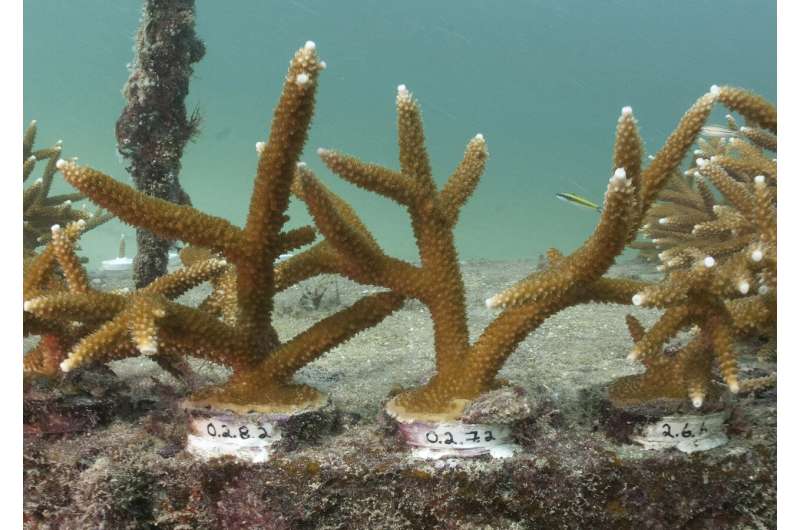This article has been reviewed according to Science X's editorial process and policies. Editors have highlighted the following attributes while ensuring the content's credibility:
fact-checked
reputable news agency
proofread
Sea temperatures lead to unprecedented, dangerous bleaching of Florida's coral reef, experts say

The coral reef off southeast Florida is experiencing an unprecedented and potentially deadly level of bleaching this summer because of rising ocean temperatures caused by climate change, federal scientists said Thursday.
Some sites around the Florida Keys are being exposed to twice the amount of heat stress that causes corals to die, and earlier in the year than ever before, scientists from the National Oceanic and Atmospheric Administration said in a telephone news conference. They said the phenomenon is likely to affect the Caribbean very soon and a global bleaching event could be just around the corner.
"We are quite concerned and worried and stressed about this event," said Ian Enochs, a research ecologist at NOAA's Atlantic Oceanographic & Meteorological Laboratory. "It's not a normal thing."
Ocean surface temperatures off the Florida coast have risen to above 90 degrees Fahrenheit (32 degrees Celsius) this summer, but scientists said they won't know the extent of damage until early next year.
The Florida Coral Reef is the world's third-largest, extending about 350 miles (563 kilometers) from the Dry Tortugas in the Gulf of Mexico to St. Lucie Inlet, about 115 miles (185 kilometers) north of Miami. The coral reef ecosystem sustains thousands of marine life species, protects against erosion and supports tourism based on scuba, snorkeling and fishing.
Coral reefs are made up of tiny organisms that link together. The reefs get their color from the algae that live inside them and are the corals' food. When temperatures get too high, the corals expel the algae, making the reefs appear white or bleached. That doesn't mean they are dead, but the corals can starve and are more susceptible to disease.
Already, there is coral bleaching along the Pacific coasts of Colombia, Costa Rica, El Salvador, Mexico and Panama, as well as along the Atlantic coasts of Belize, Cuba, Puerto Rico and the U.S. Virgin islands. Sharks have disappeared off the coast of Oaxaca, Mexico, because of the water temperature.
"Florida is just the tip of the iceberg," said Derek Manzello, coordinator of NOAA's Coral Reef Watch Program. "The scale of this event is very alarming. We are talking about thousands upon thousands of miles of coral reefs undergoing bleaching from severe heat stress."
At this point, a tropical storm or hurricane—although undesirable for other reasons—would be the best way to cool the waters and limit the damage, Manzello said.
"Unless we have significant changes in weather patterns, we are marching toward heat stress for the Caribbean in a matter of days or weeks," he said.
The world's oceans have been record-setting hot since April, with scientists citing climate change from the burning of coal, oil and natural gas along with a boost from El Niño, a natural warming of parts of the Pacific that changes weather worldwide and generally heats the planet. The bleaching happened rapidly as the water temperature rose in July.
Up and down the chain of islands that form the Florida Keys, coral rescue groups and government and academic institutions have mobilized to save the corals by relocating them to land-based facilities where they can be studied. The goal is to figure out which coral types are best at surviving heat stress and then using them to build a more resilient reef, said Andy Bruckner, research coordinator for NOAA's Florida Keys National Marine Sanctuary.
Though the ecological collapse of the reef system is possible, Bruckner said he is optimistic that restoration efforts can keep that from happening.
"I think we are near a tipping point, and how this event unfolds will tell us if we are there," Bruckner said. "But I don't feel it's too late."
© 2023 The Associated Press. All rights reserved. This material may not be published, broadcast, rewritten or redistributed without permission.




















